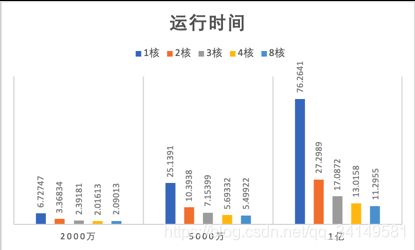- 微服务网站开发学习路线与RuoYi-Cloud实战指南
你喜欢喝可乐吗?
ruoyi-cloudmicroservicesjavaweb微服务学习运维
微服务网站开发学习路线与RuoYi-Cloud实战指南微服务架构已成为现代网站开发的主流选择,它通过将大型应用拆分为小型自治服务,实现了系统的高内聚、低耦合、独立部署和扩展。掌握微服务开发技能需要系统性学习,从基础概念到技术栈再到实战应用。本文将为您提供从零开始学习微服务的完整路线图,并结合RuoYi-Cloud开源框架进行详细举例,帮助您快速上手微服务网站开发。一、微服务基础概念与架构特点微服务
- 使用Python实现的Excel像素画
简介:本项目主要使用python语言,将图片转为Excel,图片中的每一个像素转化为Excel中的每一个单元格。主要使用pillow和xlsxwriter这两个模块。项目使用一个python文件即可。一:项目功能和流程介绍项目的主要功能:就是将一张人脸图像,画在Excel表格上,图片的每一个像素点对应Excel的一个格子,俗称像素画。流程:创建Excel表,并设置行高和列宽打开图片遍历图片每一个像
- 排序算法之【归并排序】
丶小鱼丶
算法排序算法java
目录实现归并排序【MergeSort】并提供升序和降序方法归并排序方法测试LeetCode-215题实现归并排序【MergeSort】并提供升序和降序方法/***归并排序*/publicclassMergeSort{//升序排列privatestaticfinalintUP_SORT_TYPE=1;//降序排列privatestaticfinalintDOWN_SORT_TYPE=-1;/***升
- 国内外服务器的不同之处
wanhengidc
服务器运维
国内服务器主要是面向国内用户提供服务,由于进行数据传输的物理距离比较短,所以网络延迟度相对较低,当用户在使用相同运营商网络的情况下,可以通过优化的网络线路和节点布局,以此来实现快速的数据交互,满足大量用户同时访问数据的需求。若国内用户选择使用国外服务器,数据需要跨越大洋或较长的地理距离进行传输,这不可避免地会增加网络延迟,这对于一些对实时性要求极高的应用,如在线游戏、实时视频会议等场景,可能会造成
- Spring AI 函数调用(Function Call)系统设计方案
大树~~
AI应用开发spring人工智能数据库SpringAIFunctionCall
一、系统概述与设计目标1.1核心目标从零构建一个灵活、安全、高效的函数调用系统,使大语言模型能够在对话中调用应用程序中的方法,同时保持良好的开发体验和企业级特性。1.2主要功能需求支持通过注解将普通Java方法标记为可被AI调用的函数自动生成符合LLM要求的函数描述和参数定义安全地解析和执行模型的函数调用请求处理并返回执行结果给模型提供扩展点以支持不同LLM提供商的特定实现1.3设计原则开发便捷性
- 仓库货物检测:基于YOLOv5的深度学习应用与UI界面开发
YOLO实战营
YOLO深度学习ui目标跟踪目标检测人工智能
一、引言随着电商和物流行业的快速发展,仓库货物管理已经成为企业运营中至关重要的环节。为了提高仓库管理的效率和准确性,越来越多的企业开始应用自动化技术来完成货物的盘点、分类、分拣等任务。传统的货物管理方式通常依赖人工检查,不仅效率低下,而且容易出现误差。为了克服这些问题,利用计算机视觉和深度学习技术来实现仓库货物的自动化检测成为了一种有效的解决方案。本博客将介绍如何使用YOLOv5进行仓库货物检测,
- 大前端几种开发语言对比
Fighting Horse
开发语言flutterswiftkotlin
项目概述语言特性备注基本类型BasicOperators整数、浮点数C++整数类型宽度不固定,如int,自动数值类型转换Java没有无符号整数,存在装箱Box类型C#Swift基本tuple类型KotlinT?是Box的支持原生类型数组IntArray等无符号整数是Beta的,通过内联类实现Dart运算符BasicOperators赋值、流程、算术、位、逻辑、关系运算符下标、后缀、前缀运算符三元条
- Node+OBS直播服务器搭建总结
马克关
Node教程直播nodeobs
导语:最近研究了一下网页直播流的原理以及实现,现在就目前的实现方法做一个总结。目录直播流媒体协议拉流与推流Node服务搭建前端播放页面OBS推流配置直播流媒体协议先来了解一下基本的直播流媒体协议。http-flv,rtpm协议/特点开发者原理优点缺点http-flvAbode通过服务器把flv下载到本地缓存,然后通过NetConnection本地连接播放节省服务器消耗保密性差rtmpAbode通过
- LeetCode 数据流中的第 K 大元素
吴敬悦
设计一个找到数据流中第k大元素的类(class)。注意是排序后的第k大元素,不是第k个不同的元素。请实现KthLargest类:KthLargest(intk,int[]nums)使用整数k和整数流nums初始化对象。intadd(intval)将val插入数据流nums后,返回当前数据流中第k大的元素。示例:输入:["KthLargest","add","add","add","add","ad
- [特殊字符] LLM(大型语言模型):智能时代的语言引擎与通用推理基座
大千AI助手
人工智能Python#OTHER语言模型人工智能自然语言处理LLM大模型Transformer
本文由「大千AI助手」原创发布,专注用真话讲AI,回归技术本质。拒绝神话或妖魔化。搜索「大千AI助手」关注我,一起撕掉过度包装,学习真实的AI技术!从千亿参数到人类认知的AI革命一、核心定义与核心特征LLM(LargeLanguageModel)是基于海量文本数据训练的深度学习模型,通过神经网络架构(尤其是Transformer)模拟人类语言的复杂规律,实现文本理解、生成与推理任务。其核心特征可概
- C语言--函数
在C语言中,函数类型最常见的有两种:库函数、自定义函数;我们可以类比数学中的函数如一次函数y=ax+b,是通过特定的表达式(语句)完成我们所需要的功能的一个媒介(代码块/子程序)通过对C语言编程的基本了解,我们可以知道,程序或代码实现特定的功能需要通过不同的语句和函数的组合。不需要我们定义可以直接使用的函数(但需要包含头文件),我们称之为库函数;C语言标准中规定了C语言的各种语法规则,C语言并不提
- 【深入C++】std::move 空基类优化智能指针 vector<bool>
阿猿收手吧!
遣返回家的C家家c++开发语言
文章目录std::move是啥?干了啥?一、底层原理:转换而非移动二、核心应用场景:高效转移资源所有权三、关键注意事项与陷阱四、总结空基类优化一、空类的内存占用二、空基类优化的原理三、优化生效的条件四、应用场景五、注意事项move和智能指针的有趣结合实现`std::unique_ptr`移动语义的核心要素`unique_ptr`简化版实现代码移动操作关键解析移动构造函数实现移动赋值运算符实现使用示
- 【C++】std::exchange 原子性 返回值优化RVO
阿猿收手吧!
遣返回家的C家家c++开发语言
文章目录std::exchange`std::exchange`的版本引入与底层原理1.**引入版本**2.**底层原理**核心实现(简化版):典型用法示例:3.**C++11之前的替代方案**4.经典应用场景对比C++11风格(推荐):C++98风格:5.性能对比(GCC-O3)6.现代C++的演进关键总结`std::exchange`和`std::swap`示例对比总结`std::exchan
- HTML+CSS制作人物介绍网页
Kyra17
html5css
*仅作个人学习记录用*网页效果视频演示代码实现HTML部分角色简介角色故事技能介绍艾尔海森「诲韬诤言」「文弱的学术分子」米哈游出品的游戏《原神》及其衍生作品中的角色,须弥教令院六大学派之一“知论派”的学者,现任教令院书记官兼任代理贤者,有过人的智慧与才能,生活得自由自在,一般人基本找不到他。在须弥的风波结束,虚空系统关闭之后,教令院还有很多亟待解决的难题。而艾尔海森身为代理贤者,又是当前教令院中非
- 2021关注亲情,珍惜友情,走好自己规划之路,此生无憾
小小白杨天天长
都说流星有求必应,2021我许下三个愿望亲情:感谢父母养育之恩。友情:友谊之花四季常青。人生之路:踏平坎坷,走出无悔人生。相信都能实现。过去已成历史,当下正在经历,未来希望无限。有生之年,不留遗憾。图|源自网络|侵删01亲情:常回家看看马克思说:还有什么比父母心中蕴藏着的情感更为神圣的呢?父母的心,是最仁慈的法官,是最贴心的朋友,是爱的太阳,它的光焰照耀、温暖着凝聚在我们心灵深处的意向!父母的爱永
- 思途html学习 0717
Asu5202
html学习前端
1.HTML基础概述HTML定义:超文本标记语言(HyperTextMarkupLanguage),用于创建网页结构。“超文本”指支持嵌入图像、音频、视频和脚本等非文本内容。编辑器推荐:VSCode、HBuilderX或IDEA都很实用。安装VSCode后,添加LiveServer插件(通过Extensions搜索安装),能实现实时预览网页(快捷键:Ctrl+S保存后自动刷新)。核心特性:空白处理
- html css js网页制作成品——HTML+CSS中国古代物理 - 中华优秀传统文化网页设计(4页)附源码
软件技术NINI
网页源码htmlcssjavascript
目录一、网站题目二、✍️网站描述三、网站介绍四、网站效果五、代码实现HTML
- 深度学习模型开发部署全流程:以YOLOv11目标检测任务为例
你喜欢喝可乐吗?
deeplearningdeploy深度学习YOLO目标检测
深度学习模型开发部署全流程:以YOLOv11目标检测任务为例深度学习模型从开发到部署的完整流程包含需求分析、数据准备、模型训练、模型优化、模型测试和部署运行六大核心环节。YOLOv11作为新一代目标检测模型,不仅延续了YOLO系列的高效实时性能,还在检测精度和泛化能力上取得显著突破,使其成为工业质检、安防监控、自动驾驶等领域的理想选择。本文将详细阐述这一完整流程,并结合YOLOv11的具体实现,提
- html js 查询数据库,如何使用javascript查询数据库?
小编典典Javascript本身不能用于处理数据库。这是使用php(或您选择的服务器端语言)完成的。Ajax用于使用javascript向您的php脚本发送请求,而javascript则会与数据库进行通信。而且不需要页面刷新。因此,您尝试使用ajax可以轻松实现。既然您提到了jquery,就可以在jquery中签出$.ajax或$.post方法,这使过程更加简单。您需要使用ajax处理表单。Aja
- html sql连接mysql数据库_HTML连接sql数据库
旋风1968
htmlsql连接mysql数据库
怎样从HTML网页中获取SQL数据库里的数据我现在是一名学生,第一学期快结束了,老师要CSS布局HTML小编今天和大家分享我们每个学习小组用C#做HTML是无法读取数据库的,HTML是页面前端脚本语言,要想从HTML网页中获取SQL数据库里的数据,需要借助JSP或ASP或PHP或RUBY等语言来实现。简单的关系可以这样理解:数据库JSP或ASP或PHP或RUBY等语言HTML如:在JSP页面中显示
- html 显示 数据库图片.js,html实时显示数据 怎么让数据库的数据在html显示出来
UnstructuredIO
html显示数据库图片.js
用JS实时调用数据显示在HTML页面上不要站在现在的高度,去判定未来的事情,因为未来的你是会成长的,会有新的选择和判断。html页面上怎么显示动态数据通过AJAX实现,在html页面用ajax请分享后台获取动态数据。获取range的值就行了,然后将其显示出来,你实时改变range的值,显示的就会实时改变0functionchange(){varvalue=document.getElementBy
- 5.8g微波雷达芯片_导弹、卫星、雷达的军用芯片龙头——亚光科技
小胖娃
5.8g微波雷达芯片
亚光电子(上市公司持股97.38%)是国内最大的微波半导体器件、微波电路军用企业之一,与中电科13所、55所同处国内军用微波组件第一梯队。亚光电子主要产品为半导体分立器件、芯片、微波电路及组件,应用于三大领域:雷达、导引头、航天通信(卫星等航天器)。从产业逻辑上来看,亚光电子与紫光国微同处高景气度的军用芯片赛道。亚光电子做军用模拟芯片,实现微波信号的接收与发射,亚光电子的产业也聚焦于收发处理环节;
- python分布式爬虫打造搜索引擎--------scrapy实现
weixin_30515513
爬虫python开发工具
http://www.cnblogs.com/jinxiao-pu/p/6706319.html最近在网上学习一门关于scrapy爬虫的课程,觉得还不错,以下是目录还在更新中,我觉得有必要好好的做下笔记,研究研究。第1章课程介绍1-1python分布式爬虫打造搜索引擎简介07:23第2章windows下搭建开发环境2-1pycharm的安装和简单使用10:272-2mysql和navicat的安装
- 构建强大的物联网架构所需了解的一切
雪兽软件
科技前沿物联网架构
数据正驱动着当今的商业发展,而物联网(IoT)则有助于为企业的增长和创新开辟新的机遇。麦肯锡的研究表明,全球数据在四年内实现了惊人的7倍增长。随着越来越多的物联网设备进入市场,更多企业开始需要强大的物联网架构,以管理复杂且可扩展的系统。“物联网效应”是这种快速增长的原因之一。通过实施物联网,各行业的架构企业开启了一个充满可能性的新世界,降低了成本,提升了客户体验,并在竞争中处于领先地位。因此,无论
- 基于vue+Cesium实现交互式攻击箭头绘制
引言在地理信息系统(GIS)和军事模拟领域,箭头绘制是一项基础且重要的功能。本文将介绍如何使用Cesium.js结合Vue框架实现交互式攻击箭头绘制功能,支持鼠标点击采集关键点、动态更新箭头形状、右键结束绘制等核心交互,并对实现过程中的关键技术点进行深入解析。功能概述本组件实现了以下核心功能:地图初始化与基础配置鼠标左键点击采集箭头关键点鼠标移动实时更新箭头形状右键点击结束绘制并输出结果动态渲染箭
- Java全栈面试实录:从Spring Boot到AI大模型,互联网大厂求职者的技术洗礼
**第一轮提问面试官:小曾,先谈谈你在SpringBoot项目中的缓存实践。小曾:我常用Redis,通过@Cacheable注解实现方法缓存,配置了Redis集群模式。面试官:很好!在电商秒杀场景,如果缓存击穿怎么办?小曾:可以用布隆过滤器或互斥锁解决,但具体实现得看业务...面试官:你提到SpringCloud,能说说服务注册选Consul还是Eureka?小曾:Eureka简单,Consul更
- 暑期自学嵌入式——Day04(C语言阶段)
一位搞嵌入式的 genius
嵌入式自学专栏嵌入式C语言linux
点关注不迷路哟。你的点赞、收藏,一键三连,是我持续更新的动力哟!!!目录C语言控制语句控制语句if(上)一、控制语句分类1.基本结构与学习要求2.分支语句3.循环语句4.学习方法建议二、分支语句:if-else详解1.if语句概述2.if语句的常见形式(1)简化形式(省略else)(2)阶梯形式(elseif多分支)3.应用案例:输入分数评级题目要求设计思路与代码实现关键解析4.if语句的嵌套形式
- 深度学习:让 AI 拥有 “思考” 能力的核心技术
田园Coder
人工智能科普人工智能科普
1.深度学习:突破传统的AI“进阶版”1.1什么是深度学习?深度学习是机器学习的一个分支,它通过模拟人脑神经网络的多层结构,让AI能够自动学习数据中的复杂特征,从而完成更高级的认知任务。例如,传统机器学习需要人类手动提取“猫有尖耳朵、胡须”等特征,而深度学习能直接从原始图片中,自主学习从像素到轮廓、再到整体形态的多层特征,最终实现更精准的识别。这种“自主提取特征”的能力,让深度学习突破了传统AI的
- AI产品经理面试宝典第18天:AI思维矩阵构建与实战应用面试题与答法
TGITCIC
AI产品经理一线大厂面试题产品经理面试AI产品经理面试大模型产品经理面试AI面试大模型面试
如何构建AI思维矩阵?产品经理的"降维攻击"密码面试官:请解释什么是AI思维矩阵?作为产品经理如何构建这种思维?你的回答:AI思维矩阵不是技术架构,而是产品经理在AI时代的核心认知框架。它包含四个关键维度:软硬结合创新:如智能音箱通过硬件采集语音数据,软件优化交互体验,形成闭环数据驱动决策:在智能客服场景中,通过用户对话数据优化意图识别模型,实现NLU准确率提升30%生态协同视角:以智能家居为例,
- etcd:从应用场景到实现原理的全方位解读
转自:http://www.infoq.com/cn/articles/etcd-interpretation-application-scenario-implement-principleetcd:从应用场景到实现原理的全方位解读随着CoreOS和Kubernetes等项目在开源社区日益火热,它们项目中都用到的etcd组件作为一个高可用强一致性的服务发现存储仓库,渐渐为开发人员所关注。在云计算
- Js函数返回值
_wy_
jsreturn
一、返回控制与函数结果,语法为:return 表达式;作用: 结束函数执行,返回调用函数,而且把表达式的值作为函数的结果 二、返回控制语法为:return;作用: 结束函数执行,返回调用函数,而且把undefined作为函数的结果 在大多数情况下,为事件处理函数返回false,可以防止默认的事件行为.例如,默认情况下点击一个<a>元素,页面会跳转到该元素href属性
- MySQL 的 char 与 varchar
bylijinnan
mysql
今天发现,create table 时,MySQL 4.1有时会把 char 自动转换成 varchar
测试举例:
CREATE TABLE `varcharLessThan4` (
`lastName` varchar(3)
) ;
mysql> desc varcharLessThan4;
+----------+---------+------+-
- Quartz——TriggerListener和JobListener
eksliang
TriggerListenerJobListenerquartz
转载请出自出处:http://eksliang.iteye.com/blog/2208624 一.概述
listener是一个监听器对象,用于监听scheduler中发生的事件,然后执行相应的操作;你可能已经猜到了,TriggerListeners接受与trigger相关的事件,JobListeners接受与jobs相关的事件。
二.JobListener监听器
j
- oracle层次查询
18289753290
oracle;层次查询;树查询
.oracle层次查询(connect by)
oracle的emp表中包含了一列mgr指出谁是雇员的经理,由于经理也是雇员,所以经理的信息也存储在emp表中。这样emp表就是一个自引用表,表中的mgr列是一个自引用列,它指向emp表中的empno列,mgr表示一个员工的管理者,
select empno,mgr,ename,sal from e
- 通过反射把map中的属性赋值到实体类bean对象中
酷的飞上天空
javaee泛型类型转换
使用过struts2后感觉最方便的就是这个框架能自动把表单的参数赋值到action里面的对象中
但现在主要使用Spring框架的MVC,虽然也有@ModelAttribute可以使用但是明显感觉不方便。
好吧,那就自己再造一个轮子吧。
原理都知道,就是利用反射进行字段的赋值,下面贴代码
主要类如下:
import java.lang.reflect.Field;
imp
- SAP HANA数据存储:传统硬盘的瓶颈问题
蓝儿唯美
HANA
SAPHANA平台有各种各样的应用场景,这也意味着客户的实施方法有许多种选择,关键是如何挑选最适合他们需求的实施方案。
在 《Implementing SAP HANA》这本书中,介绍了SAP平台在现实场景中的运作原理,并给出了实施建议和成功案例供参考。本系列文章节选自《Implementing SAP HANA》,介绍了行存储和列存储的各自特点,以及SAP HANA的数据存储方式如何提升空间压
- Java Socket 多线程实现文件传输
随便小屋
javasocket
高级操作系统作业,让用Socket实现文件传输,有些代码也是在网上找的,写的不好,如果大家能用就用上。
客户端类:
package edu.logic.client;
import java.io.BufferedInputStream;
import java.io.Buffered
- java初学者路径
aijuans
java
学习Java有没有什么捷径?要想学好Java,首先要知道Java的大致分类。自从Sun推出Java以来,就力图使之无所不包,所以Java发展到现在,按应用来分主要分为三大块:J2SE,J2ME和J2EE,这也就是Sun ONE(Open Net Environment)体系。J2SE就是Java2的标准版,主要用于桌面应用软件的编程;J2ME主要应用于嵌入是系统开发,如手机和PDA的编程;J2EE
- APP推广
aoyouzi
APP推广
一,免费篇
1,APP推荐类网站自主推荐
最美应用、酷安网、DEMO8、木蚂蚁发现频道等,如果产品独特新颖,还能获取最美应用的评测推荐。PS:推荐简单。只要产品有趣好玩,用户会自主分享传播。例如足迹APP在最美应用推荐一次,几天用户暴增将服务器击垮。
2,各大应用商店首发合作
老实盯着排期,多给应用市场官方负责人献殷勤。
3,论坛贴吧推广
百度知道,百度贴吧,猫扑论坛,天涯社区,豆瓣(
- JSP转发与重定向
百合不是茶
jspservletJava Webjsp转发
在servlet和jsp中我们经常需要请求,这时就需要用到转发和重定向;
转发包括;forward和include
例子;forwrad转发; 将请求装法给reg.html页面
关键代码;
req.getRequestDispatcher("reg.html
- web.xml之jsp-config
bijian1013
javaweb.xmlservletjsp-config
1.作用:主要用于设定JSP页面的相关配置。
2.常见定义:
<jsp-config>
<taglib>
<taglib-uri>URI(定义TLD文件的URI,JSP页面的tablib命令可以经由此URI获取到TLD文件)</tablib-uri>
<taglib-location>
TLD文件所在的位置
- JSF2.2 ViewScoped Using CDI
sunjing
CDIJSF 2.2ViewScoped
JSF 2.0 introduced annotation @ViewScoped; A bean annotated with this scope maintained its state as long as the user stays on the same view(reloads or navigation - no intervening views). One problem w
- 【分布式数据一致性二】Zookeeper数据读写一致性
bit1129
zookeeper
很多文档说Zookeeper是强一致性保证,事实不然。关于一致性模型请参考http://bit1129.iteye.com/blog/2155336
Zookeeper的数据同步协议
Zookeeper采用称为Quorum Based Protocol的数据同步协议。假如Zookeeper集群有N台Zookeeper服务器(N通常取奇数,3台能够满足数据可靠性同时
- Java开发笔记
白糖_
java开发
1、Map<key,value>的remove方法只能识别相同类型的key值
Map<Integer,String> map = new HashMap<Integer,String>();
map.put(1,"a");
map.put(2,"b");
map.put(3,"c"
- 图片黑色阴影
bozch
图片
.event{ padding:0; width:460px; min-width: 460px; border:0px solid #e4e4e4; height: 350px; min-heig
- 编程之美-饮料供货-动态规划
bylijinnan
动态规划
import java.util.Arrays;
import java.util.Random;
public class BeverageSupply {
/**
* 编程之美 饮料供货
* 设Opt(V’,i)表示从i到n-1种饮料中,总容量为V’的方案中,满意度之和的最大值。
* 那么递归式就应该是:Opt(V’,i)=max{ k * Hi+Op
- ajax大参数(大数据)提交性能分析
chenbowen00
WebAjax框架浏览器prototype
近期在项目中发现如下一个问题
项目中有个提交现场事件的功能,该功能主要是在web客户端保存现场数据(主要有截屏,终端日志等信息)然后提交到服务器上方便我们分析定位问题。客户在使用该功能的过程中反应点击提交后反应很慢,大概要等10到20秒的时间浏览器才能操作,期间页面不响应事件。
根据客户描述分析了下的代码流程,很简单,主要通过OCX控件截屏,在将前端的日志等文件使用OCX控件打包,在将之转换为
- [宇宙与天文]在太空采矿,在太空建造
comsci
我们在太空进行工业活动...但是不太可能把太空工业产品又运回到地面上进行加工,而一般是在哪里开采,就在哪里加工,太空的微重力环境,可能会使我们的工业产品的制造尺度非常巨大....
地球上制造的最大工业机器是超级油轮和航空母舰,再大些就会遇到困难了,但是在空间船坞中,制造的最大工业机器,可能就没
- ORACLE中CONSTRAINT的四对属性
daizj
oracleCONSTRAINT
ORACLE中CONSTRAINT的四对属性
summary:在data migrate时,某些表的约束总是困扰着我们,让我们的migratet举步维艰,如何利用约束本身的属性来处理这些问题呢?本文详细介绍了约束的四对属性: Deferrable/not deferrable, Deferred/immediate, enalbe/disable, validate/novalidate,以及如
- Gradle入门教程
dengkane
gradle
一、寻找gradle的历程
一开始的时候,我们只有一个工程,所有要用到的jar包都放到工程目录下面,时间长了,工程越来越大,使用到的jar包也越来越多,难以理解jar之间的依赖关系。再后来我们把旧的工程拆分到不同的工程里,靠ide来管理工程之间的依赖关系,各工程下的jar包依赖是杂乱的。一段时间后,我们发现用ide来管理项程很不方便,比如不方便脱离ide自动构建,于是我们写自己的ant脚本。再后
- C语言简单循环示例
dcj3sjt126com
c
# include <stdio.h>
int main(void)
{
int i;
int count = 0;
int sum = 0;
float avg;
for (i=1; i<=100; i++)
{
if (i%2==0)
{
count++;
sum += i;
}
}
avg
- presentModalViewController 的动画效果
dcj3sjt126com
controller
系统自带(四种效果):
presentModalViewController模态的动画效果设置:
[cpp]
view plain
copy
UIViewController *detailViewController = [[UIViewController al
- java 二分查找
shuizhaosi888
二分查找java二分查找
需求:在排好顺序的一串数字中,找到数字T
一般解法:从左到右扫描数据,其运行花费线性时间O(N)。然而这个算法并没有用到该表已经排序的事实。
/**
*
* @param array
* 顺序数组
* @param t
* 要查找对象
* @return
*/
public stati
- Spring Security(07)——缓存UserDetails
234390216
ehcache缓存Spring Security
Spring Security提供了一个实现了可以缓存UserDetails的UserDetailsService实现类,CachingUserDetailsService。该类的构造接收一个用于真正加载UserDetails的UserDetailsService实现类。当需要加载UserDetails时,其首先会从缓存中获取,如果缓存中没
- Dozer 深层次复制
jayluns
VOmavenpo
最近在做项目上遇到了一些小问题,因为架构在做设计的时候web前段展示用到了vo层,而在后台进行与数据库层操作的时候用到的是Po层。这样在业务层返回vo到控制层,每一次都需要从po-->转化到vo层,用到BeanUtils.copyProperties(source, target)只能复制简单的属性,因为实体类都配置了hibernate那些关联关系,所以它满足不了现在的需求,但后发现还有个很
- CSS规范整理(摘自懒人图库)
a409435341
htmlUIcss浏览器
刚没事闲着在网上瞎逛,找了一篇CSS规范整理,粗略看了一下后还蛮有一定的道理,并自问是否有这样的规范,这也是初入前端开发的人一个很好的规范吧。
一、文件规范
1、文件均归档至约定的目录中。
具体要求通过豆瓣的CSS规范进行讲解:
所有的CSS分为两大类:通用类和业务类。通用的CSS文件,放在如下目录中:
基本样式库 /css/core
- C++动态链接库创建与使用
你不认识的休道人
C++dll
一、创建动态链接库
1.新建工程test中选择”MFC [dll]”dll类型选择第二项"Regular DLL With MFC shared linked",完成
2.在test.h中添加
extern “C” 返回类型 _declspec(dllexport)函数名(参数列表);
3.在test.cpp中最后写
extern “C” 返回类型 _decls
- Android代码混淆之ProGuard
rensanning
ProGuard
Android应用的Java代码,通过反编译apk文件(dex2jar、apktool)很容易得到源代码,所以在release版本的apk中一定要混淆一下一些关键的Java源码。
ProGuard是一个开源的Java代码混淆器(obfuscation)。ADT r8开始它被默认集成到了Android SDK中。
官网:
http://proguard.sourceforge.net/
- 程序员在编程中遇到的奇葩弱智问题
tomcat_oracle
jquery编程ide
现在收集一下:
排名不分先后,按照发言顺序来的。
1、Jquery插件一个通用函数一直报错,尤其是很明显是存在的函数,很有可能就是你没有引入jquery。。。或者版本不对
2、调试半天没变化:不在同一个文件中调试。这个很可怕,我们很多时候会备份好几个项目,改完发现改错了。有个群友说的好: 在汤匙
- 解决maven-dependency-plugin (goals "copy-dependencies","unpack") is not supported
xp9802
dependency
解决办法:在plugins之前添加如下pluginManagement,二者前后顺序如下:
[html]
view plain
copy
<build>
<pluginManagement


